Artificial Intelligence (AI) has evolved from being a futuristic concept into one of the most powerful drivers of technological change in the 21st century. By 2025, AI is deeply integrated into our daily lives—powering smart assistants, medical diagnostics, self-driving cars, personalized shopping, and even creative content generation. What was once limited to research labs is now shaping industries, economies, and societies across the globe.
This article explores the future of artificial intelligence in 2025, including key trends, practical applications, ethical challenges, and predictions for how AI will continue to transform the world in the years ahead.
1. Why Artificial Intelligence Matters
AI is not just about robots or automation—it is about enabling machines to learn, reason, and make decisions in ways that enhance human capabilities. From healthcare breakthroughs to smarter business operations, AI increases efficiency, reduces costs, and unlocks new possibilities. As industries become more data-driven, AI serves as the foundation for innovation and competitiveness.
2. Key Trends in AI for 2025
2.1 Generative AI – Tools capable of producing text, images, videos, and even software code are becoming mainstream. Businesses are using generative AI for content creation, design, marketing, and customer service, significantly improving productivity.
2.2 AI in Healthcare – AI-powered systems are diagnosing diseases, predicting patient outcomes, and personalizing treatments. By analyzing massive datasets, AI helps doctors provide faster and more accurate care, particularly in oncology, cardiology, and mental health.
2.3 Autonomous Vehicles – Self-driving technology continues to advance. While fully driverless cars are still in development, AI is enhancing vehicle safety through advanced driver-assistance systems, reducing accidents and traffic congestion.
2.4 AI in Business Operations – Companies are leveraging AI for supply chain optimization, fraud detection, predictive analytics, and customer experience personalization. Chatbots and virtual assistants powered by AI are now standard in customer service.
2.5 Edge AI – Instead of relying solely on cloud computing, AI is increasingly being deployed directly on devices (smartphones, wearables, IoT). Edge AI allows faster processing, reduces latency, and improves privacy.
2.6 AI and Sustainability – AI is being applied to monitor climate change, optimize energy consumption, and improve agricultural yields. By analyzing environmental data, AI supports global efforts toward sustainability and conservation.
3. Everyday Applications of AI
3.1 Smart Homes – AI powers devices like voice assistants, smart thermostats, and security systems, creating more efficient and personalized living environments.
3.2 Education – AI tutors and adaptive learning platforms customize education to individual student needs, making learning more engaging and effective.
3.3 Finance – AI detects fraudulent transactions, powers robo-advisors for investments, and helps banks deliver personalized financial services.
3.4 Entertainment – From movie recommendations to AI-generated music, artificial intelligence is reshaping how people consume media and interact with digital platforms.
3.5 Retail – Personalized shopping experiences, dynamic pricing, and automated inventory management are made possible through AI analytics.
4. Ethical Challenges of AI
While AI brings opportunities, it also raises important ethical questions:
4.1 Bias and Fairness – AI models are only as good as the data they are trained on. If the data contains bias, the outcomes can be discriminatory. Ensuring fairness and inclusivity remains a major challenge.
4.2 Privacy Concerns – AI systems often require large amounts of personal data. Without proper safeguards, this can lead to privacy violations and misuse of information.
4.3 Job Displacement – Automation powered by AI may replace certain jobs, particularly in manufacturing, retail, and administrative roles. Preparing the workforce for reskilling is critical.
4.4 Accountability – Who is responsible when an AI system makes a mistake? Clear policies and regulations are needed to assign accountability.
4.5 Security Risks – AI itself can be used maliciously, such as in deepfakes, cyberattacks, or autonomous weapons, creating new threats to society.
5. Government and Industry Roles
Governments around the world are introducing regulations to ensure AI is developed and deployed responsibly. Policies on data protection, ethical guidelines, and transparency are being established to balance innovation with safety. Meanwhile, industries are creating frameworks for responsible AI to build trust with consumers and regulators.
International collaboration is also becoming important, as AI is a global technology that transcends borders. Shared standards and ethical guidelines are key to preventing misuse and ensuring equitable benefits.
6. Predictions for the Future of AI
6.1 AI as a Co-Pilot – Instead of replacing humans, AI will increasingly act as a partner, assisting workers in making decisions and improving performance.
6.2 Healthcare Breakthroughs – AI-driven drug discovery and personalized medicine will accelerate treatments for diseases that were once considered incurable.
6.3 Smarter Cities – AI will optimize traffic, energy use, and public services, making cities more sustainable and efficient.
6.4 Integration with Robotics – AI-powered robots will take on roles in industries such as logistics, agriculture, and elder care, filling labor gaps and improving efficiency.
6.5 AI Governance – As AI becomes more powerful, governance frameworks will ensure its ethical use, balancing innovation with human rights.
Conclusion
The future of artificial intelligence in 2025 is both exciting and complex. AI is reshaping industries, improving everyday life, and addressing global challenges, but it also presents ethical, social, and regulatory questions that must be addressed. By focusing on responsible innovation, businesses, governments, and individuals can ensure AI is used to benefit society as a whole.
In the coming years, AI will not simply be a tool—it will be a collaborator, partner, and driver of human progress. The choices made today about how AI is developed and deployed will determine the role it plays in shaping our shared future.

